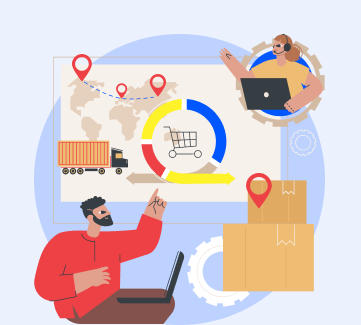In the dynamic realm of e-commerce, the “first mile delivery” has become a pivotal focus for businesses aiming to streamline their operations. This phase, often overlooked but crucial, sets the tone for the entire delivery process. So, what is first mile delivery, and how does it shape the landscape of e-commerce first mile logistics?
What is First-Mile Delivery?
The term “first mile delivery” refers to the initial leg of the supply chain where goods move from the seller’s location to the fulfillment center or the courier’s hub. Essentially, it marks the commencement of the product’s journey, setting the stage for subsequent processes. First-mile delivery is the starting point, where efficiency is paramount for a seamless first mile logistics operation. Understanding the first mile logistics meaning is crucial for businesses aiming to navigate the intricate processes involved in the initial leg of the supply chain, from the first mile pick up to the seamless first mile transportation of goods.
What is First-Mile Logistics?
The first mile in logistics is not merely a physical movement of goods but a comprehensive process that involves planning, coordination, and integration. The success of the first mile in logistics is crucial for businesses aiming to streamline their operations. This initial phase, from the first mile pick up to the intricacies of first mile transportation, sets the tone for the entire supply chain. Each step in the first mile in logistics plays a crucial role in ensuring the timely and secure movement of goods. From the initial first mile pick up to the final steps in first mile transportation, the first mile in logistics is a pivotal focus for businesses looking to enhance their overall efficiency. From first mile pick up to first mile transportation, each step plays a crucial role in determining the overall success of the supply chain.

First Mile and E-commerce Operations
In the ever-expanding realm of e-commerce, first mile delivery has emerged as a critical factor influencing customer satisfaction and loyalty. With the surge in online shopping, businesses are recognizing the need to optimize their first mile operations. This includes investing in first mile facilities, incorporating efficient first mile shipping methods, and leveraging advanced technologies for tracking and management.
First Mile Operations Process
To comprehend the significance of first mile operations, let’s break down the process. It begins with the first mile pick up, where products are collected from the seller’s location. The next step involves first mile transportation, where the goods are transported to the fulfillment centers. The efficiency of these operations directly impacts the subsequent stages of the supply chain, making it imperative for businesses to focus on optimizing their first mile logistics.
First Mile Facility
Establishing a seamless supply chain begins with the strategic implementation of a first mile facility. The first mile facility acts as the nerve center, facilitating the efficient coordination of first mile logistics processes. Within the first mile facility, meticulous planning ensures a smooth first mile pick up, laying the foundation for successful first mile transportation. The significance of a well-equipped first mile facility cannot be overstated, as it becomes the hub for optimizing first mile shipping methods. Investing in a state-of-the-art first mile facility is pivotal for businesses looking to enhance their first mile operations, providing a centralized space for the orchestration of logistics first mile processes. In essence, the success of the entire supply chain hinges upon the effectiveness of the first mile facility, making it a cornerstone in the dynamic landscape of first mile e commerce logistics.
Logistics First Mile
In the logistics landscape, the term “first mile” holds a unique position. It’s not just about physical transportation but also involves strategic planning, technology integration, and effective communication between stakeholders. Logistics first mile is about orchestrating a harmonious symphony of processes to ensure that products move seamlessly from point A to point B.
First Mile Courier and 3PL:
First mile delivery service play a pivotal role in executing the initial phase of delivery. Their efficiency in first mile logistics can significantly impact the overall customer experience. Many businesses also rely on first mile 3PL (Third-Party Logistics) providers to streamline their operations, leveraging their expertise and resources for a more efficient supply chain.
Top-5 Challenges of First-Mile Delivery Operations:
While the importance of first mile delivery cannot be overstated, it comes with its set of challenges. Some of the top challenges include:
1. Traffic Congestion
Urban areas often face congestion issues, leading to delays in first mile transportation.
2. Last-Minute Changes
Sellers may have last-minute changes in inventory or delivery schedules, challenging the planned first mile logistics.
3. Weather Impacts
Adverse weather conditions can disrupt first mile ecommerce shipping, affecting the overall delivery timeline.
4. High Operational Costs
Establishing and maintaining efficient first mile facilities can contribute significantly to operational costs.
5. Technology Integration
Some businesses may struggle with integrating advanced technologies for effective first mile tracking and management.
Role of First-Mile Tracking
In addressing the challenges, the role of first mile tracking becomes crucial. It involves using advanced tracking technologies to monitor the movement of goods in real-time. This not only enhances visibility but also enables businesses to proactively address any issues that may arise during the 1st mile delivery process.
Fulfillment in the First Mile
To overcome the challenges and streamline first mile operations, businesses often turn to fulfillment services. Fulfillment centers in Europe and beyond play a key role in optimizing the first mile logistics process. They offer a centralized hub for inventory management, packing, and dispatching, contributing to the overall efficiency of first mile delivery.
E-commerce Platforms and First Mile
For businesses operating on popular e-commerce platforms like Shopify, eBay, or Bigcommerce, the integration of first mile logistics is integral. Shopify Fulfillment , Bigcommerce Fulfillment and eBay Fulfillment services, for instance, provide businesses with tools and resources to enhance their first mile operations. These platforms act as facilitators, connecting businesses with reliable first mile courier services and optimizing the overall delivery experience.
Industry-Specific First Mile Operations
In the realm of e-commerce, different industries have unique first mile delivery requirements. From Supplement Fulfillment to Cosmetics Fulfillment, the specifics of the first mile operations may vary. Tailoring the first mile logistics process to meet the specific needs of each industry ensures a more efficient and customer-centric supply chain.
COD and First-Mile Delivery
Cash on Delivery (COD) remains a popular payment method in many regions. Integrating COD into the first mile operations process adds an additional layer of complexity. Efficient management of COD transactions is essential to ensure a smooth first mile pick up and transportation process while maintaining financial transparency. Businesses must prioritize the integration of COD into their first mile delivery process to cater to customer preferences and ensure a seamless transaction experience. The inclusion of COD in the first mile delivery process requires businesses to implement robust systems for tracking, verification, and real-time communication. By seamlessly integrating COD into the first mile delivery process, businesses can enhance customer trust and satisfaction, ultimately contributing to the success of their overall logistics operations. Efficient handling of COD transactions within the first mile delivery process is a critical aspect of maintaining a reliable and customer-centric e-commerce ecosystem.
Streamlining Supply Chains with Fulfillment Software, European Centers, and Crucial Final Mile Delivery
In the intricate landscape of modern supply chain management, businesses are increasingly turning to advanced tools like fulfillment software to optimize their operations. Fulfillment software acts as the backbone, streamlining processes from inventory management to order processing. Moreover, as e-commerce continues to thrive, the demand for efficient fulfillment centers in Europe has surged. These centers serve as strategic hubs, ensuring timely order fulfillment and reducing shipping costs. However, the efficiency of fulfillment centers doesn’t end with the last package leaving their premises; it extends to the final mile delivery. The final mile delivery is the last leg of the journey, often considered the most critical for customer satisfaction. By integrating fulfillment software and strategically fulfillment centers in Europe, businesses can enhance the entire supply chain, providing a seamless and satisfactory experience from the initial order to the final mile delivery.
Conclusion
In the intricate dance of e-commerce logistics, the first mile delivery sets the rhythm. From the first mile pick up to the final destination, each step requires careful planning and execution. Businesses must navigate the challenges, embrace advanced technologies, and collaborate with reliable partners to optimize their first mile operations. As the e-commerce landscape continues to evolve, the efficiency of the first mile delivery will play a defining role in shaping customer experiences and determining the success of businesses in this digital era.




 Community
Community
